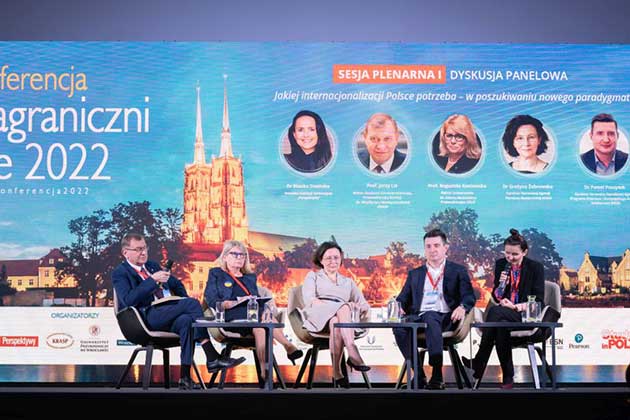The conference "Foreign students in Poland 2022", organized for the 15th time as part of the "Study in Poland" program - run jointly by the "Perspektywy" Education Foundation and the Conference of Rectors of Academic Schools in Poland (CRASP) - was originally intended to answer the question of how the internationalization of Polish universities will be influenced by digitization, accelerated so dramatically by the pandemic. However, during the two-day meeting (March 31 – April1, 2022),, hosted by the Wrocław University of Environmental and Life Sciences, the most important topic was the war in Ukraine caused by Russian aggression and its consequences for the internationalization of Polish and world higher education.
Conferences from the series "Foreign students in Poland" have always been a place of debate on the strategy of internationalization of Polish higher education and science, but due to the circumstances, this year's meeting as of exceptional importance. The overarching theme of all sessions was "Internationalization in times of uncertainty".
A conference in the city of meetings
- Everything at this conference is extraordinary - said Dr. Bianka Siwińska, president of the Perspektywy Education Foundation, opening the conference. - It is amazing that we can finally meet offline, without masks, among people from all over Poland who play key roles in the area of internationalization of universities. It is amazing that the background of our meeting is such a wonderful, multicultural city of dialogue - Wrocław. Finally, the situation we find ourselves in is remarkable, i.e. the context of Russia's aggression against Ukraine, which requires us to change the framework of contemporary internationalization, to create new assumptions for this process, to start from scratch, so to speak.
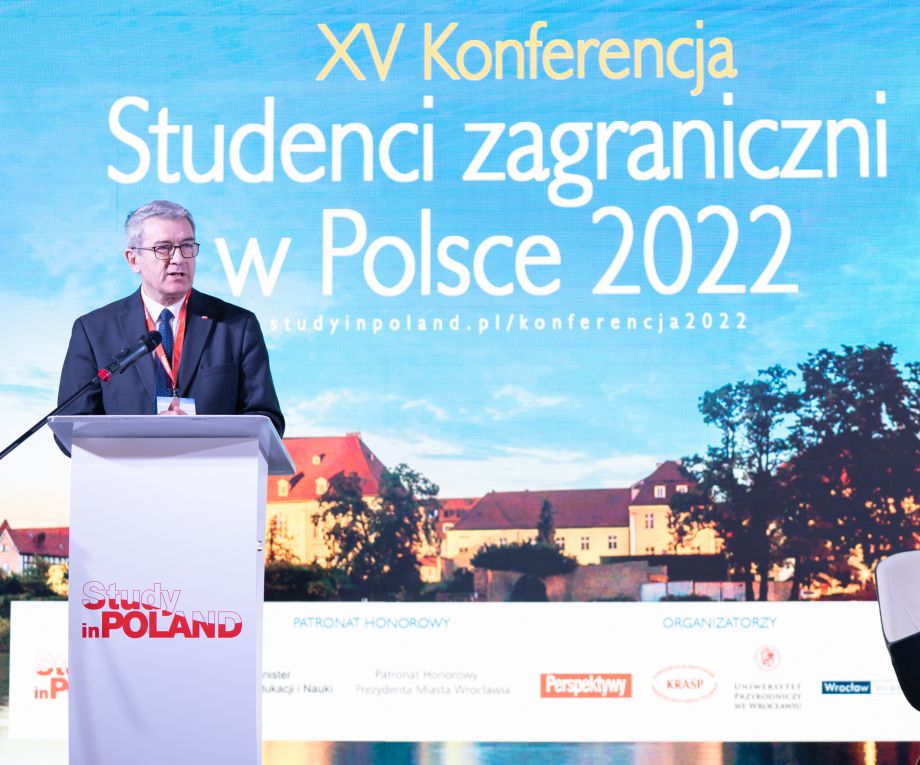
After a pandemic break talks, those within the panel debates and those in the lobby, were very lively. New issues were raised, such as support for Ukrainian universities and for Ukrainian students from Poland, some of whom left to fight in defense of their country, or the brain drain in Ukraine related to the wave of refugees.
- Recent years have shown that the internationalization of Polish science should change dynamically. We have a huge exam ahead of us and we must pass it well. For this to happen, we would have to show ourselves as open partners, able to cooperate and caring not only for our own benefits from the developing situation, but most of all for the benefits of the Ukrainian side - said Prof. Jarosław Bosy, rector of the Wrocław University of Environmental and Life Sciences. Prof. Arkadiusz Mężyk, chairman of CRASP and rector of the Silesian University of Technology, reminded that in the capital of Lower Silesia, until the outbreak of the Russian-Ukrainian war, one of the largest Ukrainian diasporas in Poland was located, and from February 24, according to estimates, up to a quarter of a million refugees could have come here.
- So far, in the context of internationalization, we wanted to build the most interesting educational offer at Polish universities for foreign students. Now there is a different situation and different expectations, especially from the Ukrainian side. We need to consider how to help Ukrainian universities maintain the continuity of education without permanently taking over their scientists and students - emphasized prof. Mężyk.
The Mayor of Wrocław, Jacek Sutryk, who was present at the opening of the conference, reminded that the academic character of the city and the tradition of the entire environment refer to Lviv universities. Scientists, students and employees of these universities - all those who survived the tragedy of World War II - left the Borderlands to the west of Poland in 1945 and many settled in Wrocław.
Wojciech Murdzek, secretary of state in the Ministry of Education and Science, also referred to history (and not only), stressing that it shows that Wrocław can effectively use changes. - Hence, I believe that both the current situation and this conference will allow us to draw conclusions useful for the future in the context of the internationalization of Polish science - said the deputy minister. He added that looking at how Polish society was able to respond quickly and spontaneously to the challenges posed by the Russian – Ukrainian war, he believes the academic community will take the right steps and show that Poland is an attractive country not only in terms of culture, economy or, for example, sports, but also in terms of security.
In search of a new paradigm
In the panel entitled "What internationalization Poland needs - in search of a new paradigm", led by dr. Bianka Siwińska, it was discussed that the current axiom that we want to have as many foreign students as possible is no longer enough. The war in Ukraine caused by Russian aggression and the two years of the pandemic posed fundamental questions to Polish higher education about the purpose, scope and methods of implementing internationalization processes.
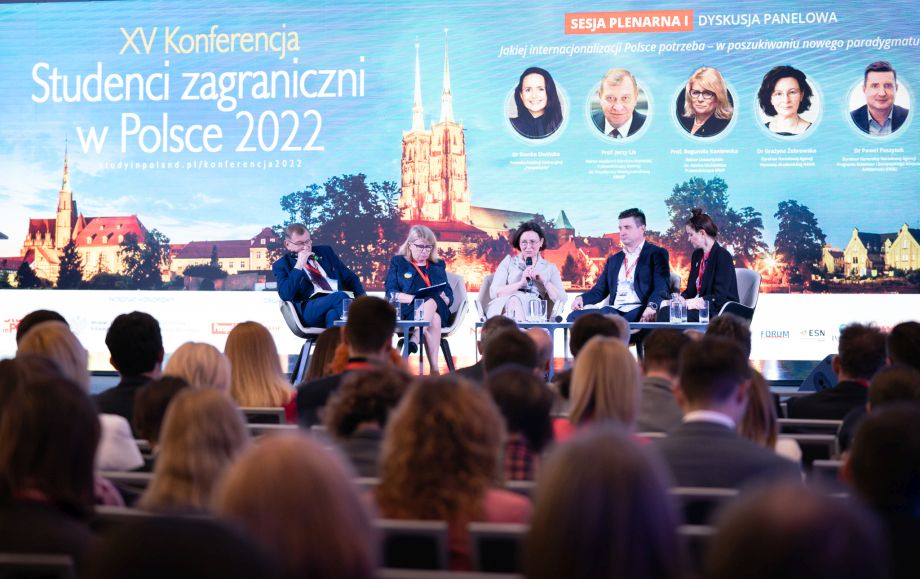
Prof. Jerzy Lis, CRASP's plenipotentiary for activities related to helping Ukraine, and the rector of the AGH University of Science and Technology in Krakow, made no secret that the situation beyond our eastern border shows how important international cooperation is in today's world, but understood in a partnership-based way. - After the pandemic, we have a well-prepared online education offer, now we can use it to help Ukrainian universities. We have to be flexible, because we have good foundations and opportunities to operate in the global education system, said the rector.
Rector of the Adam Mickiewicz University in Poznań, prof. Bogumiła Kaniewska reminded that mobility in the context of international cooperation does not have to mean trips today, but it should also be understood as permanent online contacts.
- We have to consider what the internationalization of universities should lead to. It is also necessary to reformulate the concept of mobility so that it covers not only trips abroad, but also our daily online meetings in international teams of researchers, scientists, educators, doctoral students and students. For this, a legislative level is needed - said the rector, emphasizing the attractive geographical location of Poland, which should be used by universities, focusing on a strong position in the region and the role of a link between the East and Europe. - We can be a link between the East and Europe, it is worth focusing your efforts on this.
In turn, dr. Paweł Poszytek, director of the Foundation for the Development of the Education System, summarized the current challenges of Polish universities: - What is needed is networking, providing micro-credentials and micro-qualifications as part of the education process, creating a flexible offer, and finally a return to the already outdated idea of lifelong learning. And all this within the framework of the overarching idea of EUROPEIZATION.
Ukrainian refugees in academic Wrocław
Rector of the Wrocław University of Science and Technology, prof. Arkadiusz Wójs, was one of the participants of the panel session "Academic Wrocław - students from Ukraine: challenge, commitment, opportunity?", conducted by dr. Zygmunt Krasiński, president of the Polish Chamber of Commerce for High Technology. Originally, this session was to be devoted to the academic vision of Wrocław in 2030 - with an emphasis on the challenges of creating a leading science and education center in Europe, especially in the region of the nearest countries. However, the war in Ukraine and the exodus of its inhabitants to Poland obviously changed the importance of matters. For the coming weeks and months, the most important thing is to solve the problems related to helping our neighbors, especially those who have student record books of Polish or Ukrainian universities.
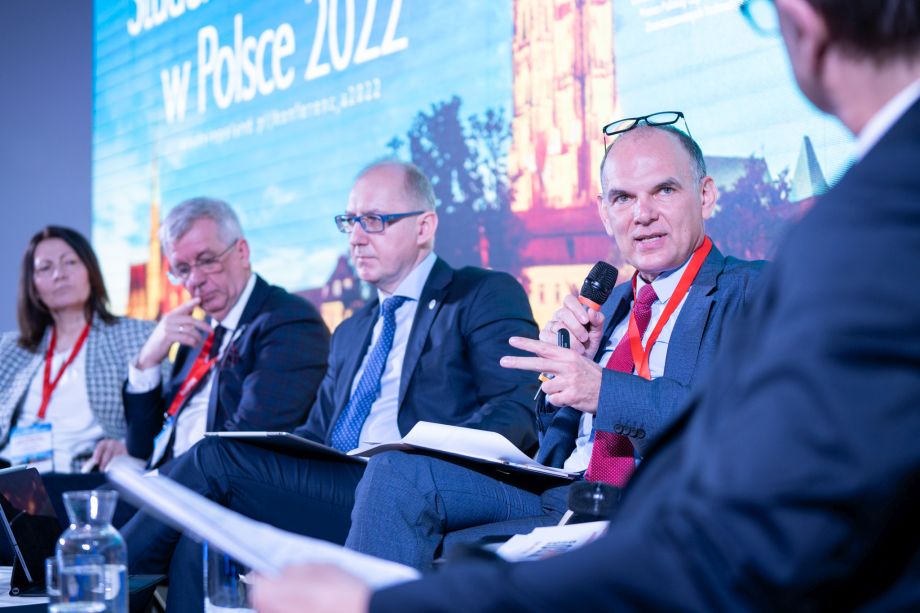
Panelists taking part in the discussion, including prof. Tomasz Zatoński, vice-rector of the Wrocław Medical University and Ukrainian student coordinator of the Conference of Rectors of Wrocław and Opole Universities, as well as prof. Bogusława Drelich-Skulska, vice-rector of the Wrocław University of Economics and Business, emphasized that in the current situation the responsibility or support of the university does not only apply to students.
Prof. Drelich-Skulska admitted that some students did not return from Ukraine after the winter session, but also some returned with their relatives, mothers and siblings. It is for them that a special point has been set up, where they can count on psychological help. Prof. Zatoński said, in turn, that for medical students who found themselves in the group of refugees, three-month Polish language courses were planned, after which they could start their studies in Poland in October (along with supplementing the curriculum difference).
Prof. Jarosław Bosy from Wrocław University of Environmental and Life Sciences reminded that no matter what our situation is, it is important to build a system in which a "foreign", i.e. a student, doctoral student, scientist from abroad, will find himself and be able to pursue studies and research. - We know that this is a difficult task, especially in the context of the relationship "stranger" - "ours". We decided that we would start with the administrative part and acquiring system funds - emphasized Jarosław Bosy.
Coalition for EuroSkills in Poland
During the conference, an agreement was officially signed establishing the Coalition for the development of the WorldSkills initiative and the organization of the Euroskills 2023 Competition in Poland. The EuroSkills competition is the first event of this rank, which not only declaratively but also realistically was taken from Russia, due to its aggression towards Ukraine (EuroSkills 2023 was originally planned in St. Petersburg).
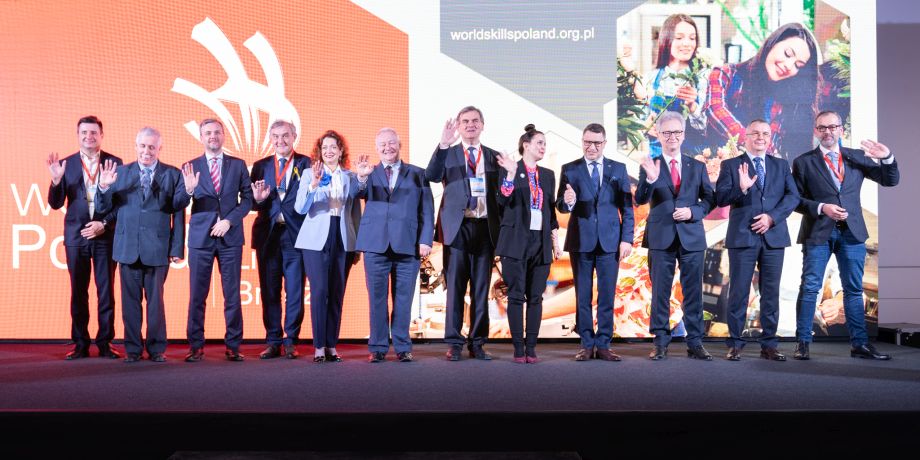
The signatories of the agreement for WorldSkills in Wrocław are: prof. Jacek Popiel, rector of the Jagiellonian University; prof. Paweł Stepnowski, rector of the University of Gdańsk; prof. Marta Kosior-Kazberuk, rector of the Bialystok University of Technology; prof. Jerzy Zając, vice-rector for education and international cooperation, Cracow University of Technology; prof. Dariusz Czerwiński, vice-rector for general affairs and development of the Lublin University of Technology; prof. Krzysztof Jóźwik, rector of the Lodz University of Technology and prof. Grzegorz Mazurek, rector of the Kozminski University.
Digitization of internationalization - yes, but how?
One of the important topics discussed during the conference was the issue of digitization of Polish universities, both in the context of developing the educational offer and scientific and research cooperation, and in relation to the marketing and recruitment strategies of Polish universities.
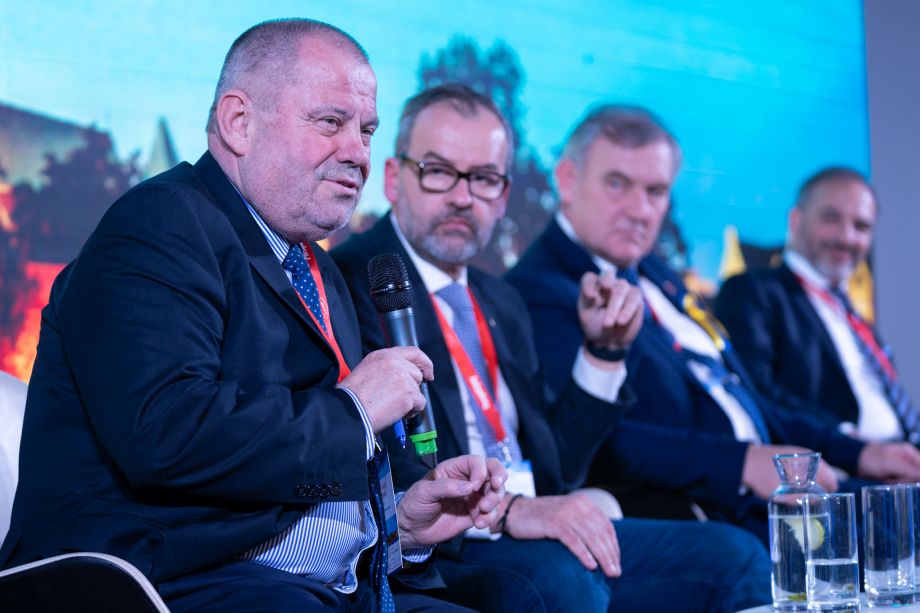
One of the sessions on this issue, entitled "University of the future - internationalization in terms of digitization”, led by prof. Grzegorz Mazurek, rector of the Kozminski University in Warsaw. He began with a metaphor: - In the title of this session, we have confronted two seemingly contradictory concepts. Internationalization, by definition, offers us everything that can be felt, smelled and touched in contact with a culture that is new to us. In turn, digitization is flat, glass, impersonal, like a computer screen. How to combine these two issues so that an attractive offer is created?
This question was answered by the panellists: prof. Alojzy Nowak, rector of the University of Warsaw, prof. Piotr Stepnowski, rector of the University of Gdańsk, prof. Krzysztof Jóźwik, rector of the Lodz University of Technology and prof. Tomasz Pietrzykowski, vice-rector for international and national cooperation at the University of Silesia, chairman of the NAWA Council.
The conclusions reached by the panellists in the course of the discussions were promising: Polish universities, thanks to the pandemic crisis, passed the digitization exam, and the technological culture of the academic community improved significantly. - Today the question should not be whether we should continue to digitize our universities, because it is obvious that we are. Why? After all, young people want digitization, and they are the most important for the university. The process management of our digitized organizations is a challenge - noted prof. Alojzy Nowak.
In turn, prof. Tomasz Pietrzykowski said that digitization should be managed so that it serves education in networks. - The future is not at all a virtual university, i.e. an excellent Cambridge or Harvard university, which attracts people for several years of online studies. This path will not work, because such education has one fundamental drawback: it does not equip students with the social competences that are so needed today. Therefore, let's digitize universities, but with a view to complementary online contact education - argued prof. Pietrzykowski.
Internationalization partners
IROs Forum and PRom Association prepared their sessions analyzing internationalization processes in more operational contexts.
The topic of digitization, in the promotional context, was discussed by the panelists during the session "Digital PR makes the WOW effect, or how the university's social media creates its brand", led by Anna Kiryjow-Radzka, president of the "PRom" Association and PR specialist at the Warsaw University of Life Sciences SGGW.
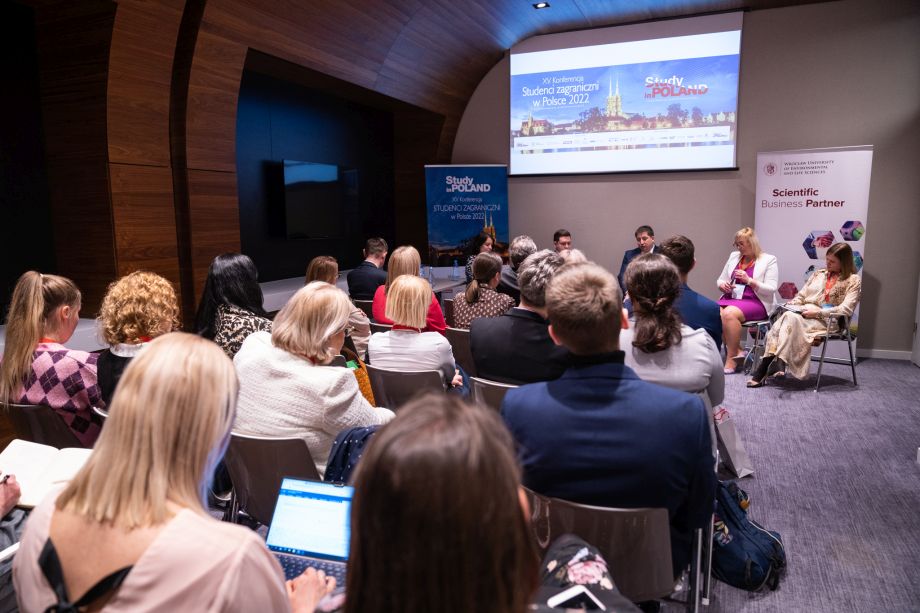
The panelists noticed, among other things, that although the university's website is today the showcase of the institution, only the presence (targeted) in social media (including Tik Tok) guarantees the university's recognition among young people. - The abundance of available information is starting to work against us, so today the challenge is not only to attract attention, but most of all to keep it - said, among others dr hab. Marta Mendel, vice-rector for international cooperation at the Warsaw University of Life Sciences SGGW.
The discussion during the second of the parallel sessions was also very interesting. "A university open to the world? Challenges, tools, good practices ”is a debate organized in cooperation with IROs Forum, chaired by Marta Foryś, president of IROs Forum. During the conversation, the functioning of Welcome Points at Polish universities was presented.
Interstudents and Internationalization Stars
Traditionally, the conference "Foreign students in Poland" is accompanied by two significant environmental events - i.e. the awarding the best foreign students in the “Interstudent competition” (this year they were awarded for the twelfth time) and the announcement of the winners of the "Internationalization Stars" (this year's edition was the fifth).
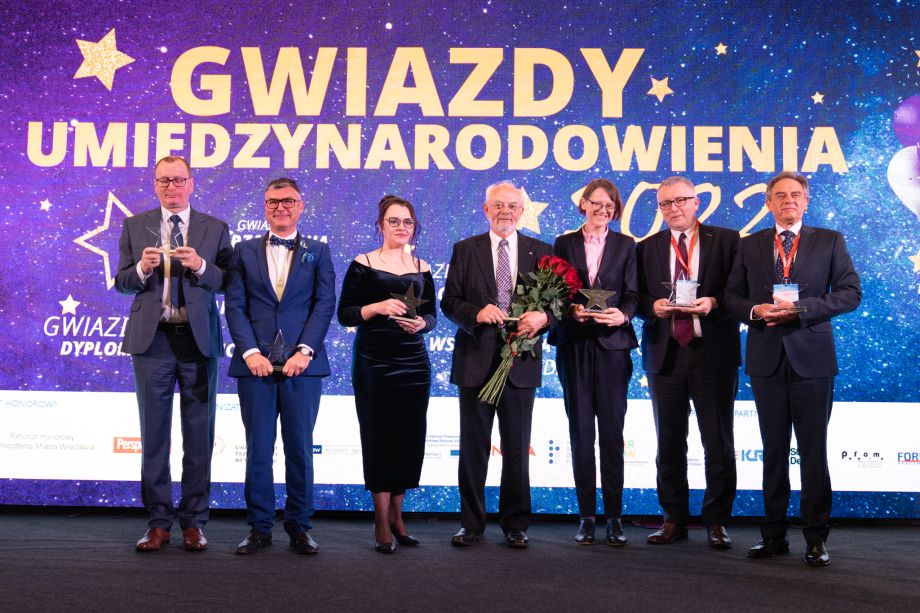
The awards were presented during a gala, which was preceded by an excellent concert of In Solidarity with Ukraine performed by students and lecturers (Poles and Ukrainians) of the Karol Lipinski Academy of Music in Wrocław. The concert program included works by Polish (including Chopin, Żeleński, Szymanowski) and Ukrainian (Zherbin, Kozarenko) composers.
Prof. Arkadiusz Mężyk, who invited people to listen to the concert, emphasized that the concert is as much an expression of solidarity with the Ukrainians suffering from the war, as well as an expression of gratitude to all people and institutions that are joining aid actions for Ukraine.
After the concert, diplomas and awards were presented to Interstudents 2022. They were awarded to:
in the bachelor's degree category: Karen Nyakato Kyabega from Tanzania, student of the Undergraduate Program in International Relations at the University of Warsaw,
in the master's degree category: Maksym Shcherbyuk, graduate of law at the University of Silesia in Katowice,
in the PhD studies category: Peliyagodage Chathura Dinerth Perera from Sri Lanka, PhD student at the Wrocław University of Environmental and Life Sciences in Wrocław.
In addition, the jury decided to award a Special Prize for extraordinary involvement in social activities. Its laureate was Yiyu Chen from China, a law student at the Jagiellonian University
Dr. Bianka Siwińska said about this year's competition: - We are looking for young people from all over the world who, through their activities, build bridges between cultures, enriching not only Polish universities, but also their entire environment. They are the ambassadors of our universities and of Poland around the world. Despite the difficult pandemic situation, we received over 80 applications and almost all candidates were fantastic, and the jury had a great problem with selecting the winners!
After the best foreign students in Poland, the stage was taken over by the winners of the "Internationalization Stars 2022" Award. - This award promotes people who open our universities to other experiences and cultures. It is an important environmental distinction, because the work put into the internationalization of universities is often overlooked, and yet has great value - emphasizes Waldemar Siwiński, founder of the Perspektywy Education Foundation, initiator of the Award.
The "Internationalization Stars 2022" awards went to:
Research Star - dr hab Łukasz Sułkowski, Jagiellonian University
Management Star - dr hab Rafał Witkowski, Adam Mickiewicz University in Poznań
Teaching Star - dr hab. Janusz Szmyd, AGH University of Science and Technology
Diplomacy Star - dr Mariusz Sagan, Lublin City Hall
Marketing Star - Liliana Lato, University of Lodz
Rising Star - Monika Wysocka, Naval Academy in Gdynia
Traditionally, the Distinguished Star special award was awarded for the overall contribution to the internationalization of Polish higher education and building its prestige in the world. This year, prof. Lauritz Holm-Nielsen, former rector of the University of Aarhus (Denmark), chairman of the international panel of experts evaluating Polish universities as part of the Excellence Initiative - Research University (IDUB) was awarded.
Laureate of the Distinguished Star, prof. Holm-Nielsen emphasized: - Thank you for this honor, which is of special importance to me, because I received it from those who are experts in the field of internationalization.
How to operate in the European network?
On the second day of the Wrocław conference, another hot topic was discussed, ie "European Universities - microcredentials and other innovative didactic formats: mobility, networking, flexibility". The session under this slogan was chaired by prof. Teofil Jesionowski, chairman of the Conference of Rectors of Polish Technical Universities and rector of the Poznań University of Technology. In the summary of one of the threads discussed in the panel of prof. Jesionowski noted: - European Universities are the beginning of building an offer for the competences of the future.
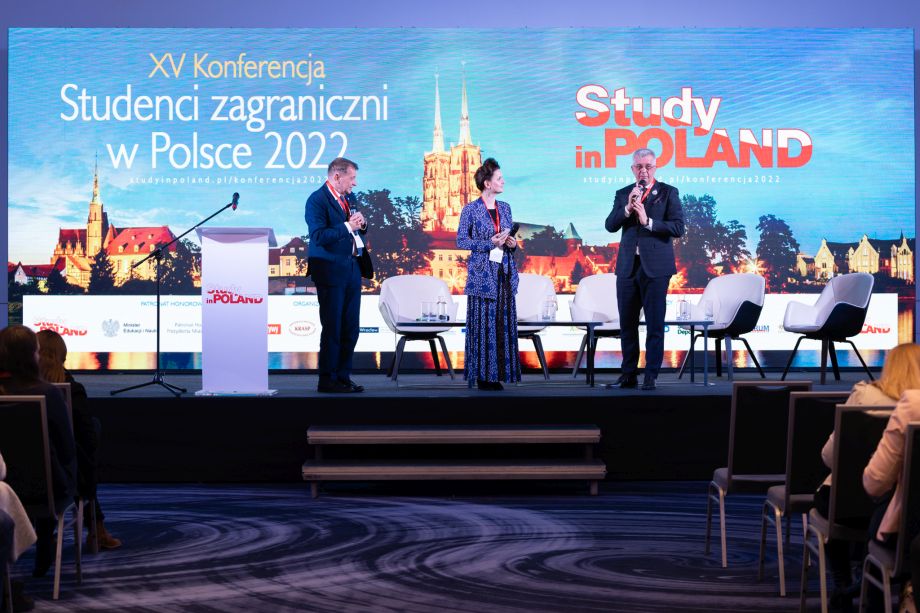
Prof. Tadeusz Uhl from AGH University of Science and Technology, coordinator of the UNIVERSEH consortium: - Our mission in the UNIVERSEH network is to make the student at all universities cooperating within the network feel at home. We want the network to be like one university with only seats in different places. Prof. Uhl emphasized that although organizationally there are no obstacles to pursue such goals, from the legislative perspective all networked universities still have a long way to go.
In turn, prof. Rafał Witkowski, Adam Mickiewicz University in Poznań, vice-rector for international cooperation and coordinator of the EPICUR Universities Consortium, referring to the issue of microcredentials, explained: - Microcredentials allows universities to offer something less than one semester and something more than one course. It is a pill of information from various fields, which can be a form of development and valuable expansion of knowledge for students.
Prof. Witkowski particularly emphasized the importance of microcredentials in the context of job searching by graduates. - As microcredentials have the importance of documented (certified by the university) additional (outside the study program) competences of a given graduate, for employers they can constitute a proof of the candidate's activity, interests and commitment to the job, and thus be a valuable guide when making a decision on employment.
In this context, prof. Dorota Piotrowska from the Lodz University of Technology, noticed that the future of the university is not students, but learners who, thanks to microcredentials, will accumulate various achievements in their portfolio, and thus decide on the specificity of their own education against the background of the increasingly diverse group of university graduates in the future.
Instead of a summary
The 15th “Foreign Students in Poland” conference, has already gone down in history. Closing it, prof. Jerzy Lis, representing CRASP, said: - Each meeting held under the banner of foreign students in Poland is important, but it was special because it concerned such an important issue as Poland's place in the global system. I would like to thank Perspektywy for giving us perspective, allowing us to discuss the dynamically changing situation and the changes that take place in the environment of Polish academies.
And prof. Jarosław Bosy added: - I would like to thank Perspektywy for trusting the Wrocław University of Life Sciences. Thanks to this trust, we started a dialogue here in Wrocław that will stay with us for a long time.
At the end of the meeting, it was also announced that the next conference in this series "Foreign students in Poland 2023" will be held in Białystok next year, and the host university will be the Medical University of Białystok.
Autors: Magda Tytuła (Perspektywy Education Fundation), kbk (Wroclaw University of Environmental and Life Sciences)
Photo: Anita Kot / Perspektywy


